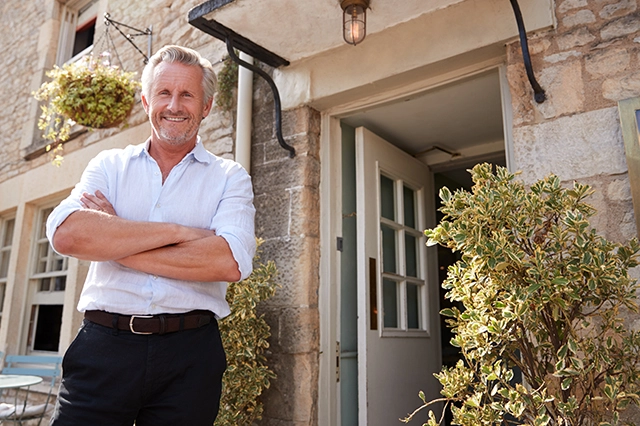What is HMO Insurance?
House in Multiple Occupation (HMO) insurance is a type of insurance policy designed specifically for who own HMO properties.
HMO insurance policies typically provide coverage for a range of risks associated with this type of rental property, such as damage to the property, loss of rental income, and liability for injuries or damages that occur on the property.
HMO insurance may also provide cover for legal expenses in the event of a dispute with a tenant, or for the costs of complying with local HMO regulations.
Standard landlord insurance policies may not provide adequate coverage for HMO properties, as they have different risk factors and regulatory requirements. While the terms may vary, HMO insurance largely parallels a standard landlord insurance policy in terms of coverage, including property owners’ liability and risks associated with tenants.
How our process works
We’ve worked hard to refine our process and keep it as quick, easy and simple as possible for our customers.
What Does HMO Insurance Cover?
There is some flexibility to customise your HMO insurance policy by combining various types of insurance, much like other types of landlord policies. The most significant features of HMO insurance include:
HMO landlord insurance cover can protect various types of properties that house multiple occupants, such as bedsits, shared houses, and student accommodations, and can provide coverage for multiple properties under a single policy.
Who Needs HMO Insurance?
If you are a landlord who owns a property where 3 or more unrelated people live, then you will need HMO Insurance. A HMO property comes with a different level of risk compared to a standard home and therefore a different type insurance is required.
HMO landlord insurance is a specialized policy designed to cover the unique risks associated with HMOs, such as higher foot traffic and potential liabilities.
In many instance, local regulations will legally requiring landlords of this style property to have insurance. In many areas across the UK, there are licencing laws where landlords for HMO properties are required to obtain a licence and to obtain that licence, they need to insure the HMO property.
Insurance for HMO’s will protect you against loss or damage to your property as a result of neglect by your tenants. It will also cover other standard things that a home policy would.
Our agents will help you compare HMO insurance quotes quickly and easily.
HMO Legal Requirements
As an HMO landlord, it’s essential to comply with various legal requirements to ensure the safety and well-being of your tenants. Failure to meet these requirements can result in fines, penalties, and even prosecution.
HMO Licensing
In the UK, HMOs with five or more occupants from two or more households require a mandatory licence from the local authority. This licence ensures that the property meets minimum safety standards and is managed properly. To obtain an HMO licence, you’ll need to provide documentation, including:
- Proof of ownership or tenancy agreement
- Gas safety certificate
- Electrical safety certificate
- Fire risk assessment
- Proof of adequate waste disposal
The licence is typically valid for five years, after which you’ll need to reapply.
HMO Fire Safety and Smoke Alarms
HMOs are required to have working smoke alarms on every floor, and these must be tested regularly. You’ll also need to ensure that your property meets the necessary fire safety standards, including:
- A fire risk assessment
- A fire alarm system
- Fire extinguishers
- Emergency escape routes
Failure to comply with fire safety regulations can result in serious consequences, including fines and prosecution.
HMO Room Sizes
As of October 2018, HMO landlords are required to adhere to strict minimum room sizes. The minimum room size for a single person is 6.51 square meters, and for two people, it’s 10.22 square meters. You’ll need to ensure that each room in your HMO meets these minimum size requirements.
Fitness for Human Habitation
HMOs must be “fit for human habitation,” meaning they must be safe and free from hazards that could cause damage to health or quality of living. This includes ensuring that the property is:
- Free from damp and mould
- Well-ventilated
- Well-maintained
- Free from hazards such as faulty electrical wiring or broken furniture
HMO Safety Requirements
As an HMO landlord, you’re responsible for ensuring that your property meets various safety requirements, including:
- Annual gas safety checks
- Regular electrical safety checks
- Fire safety checks
- Ensuring that all furniture and appliances are safe and well-maintained
Failure to comply with these safety requirements can result in serious consequences, including fines and prosecution.
By complying with these HMO legal requirements, you can ensure that your property is safe and well-maintained, and that you’re providing a good standard of living for your tenants.
Do I Need HMO Cover If I Already Have Landlord Insurance?
Landlord cover and HMO cover are all that different. However, when renting separate rooms out to multiple households or tenants, there is the increased chance of damage.
If you have a property portfolio policy for multiple properties, there is a good chance that a HMO property will be allowed. It is essential though that you confirm this with your insurance provider and should never just be assumed.
If you have a property that you insure that you turn into a HMO, it is essential that you change the policy for it to cover the additional list.
Frequently Asked Questions
Related News
Ways to Save Money on Landlord Insurance
Get a Quick Landlord Insurance Quote Many people look to invest in property as a way of investment or income. This can vary from single residential landlord properties through to commercial



